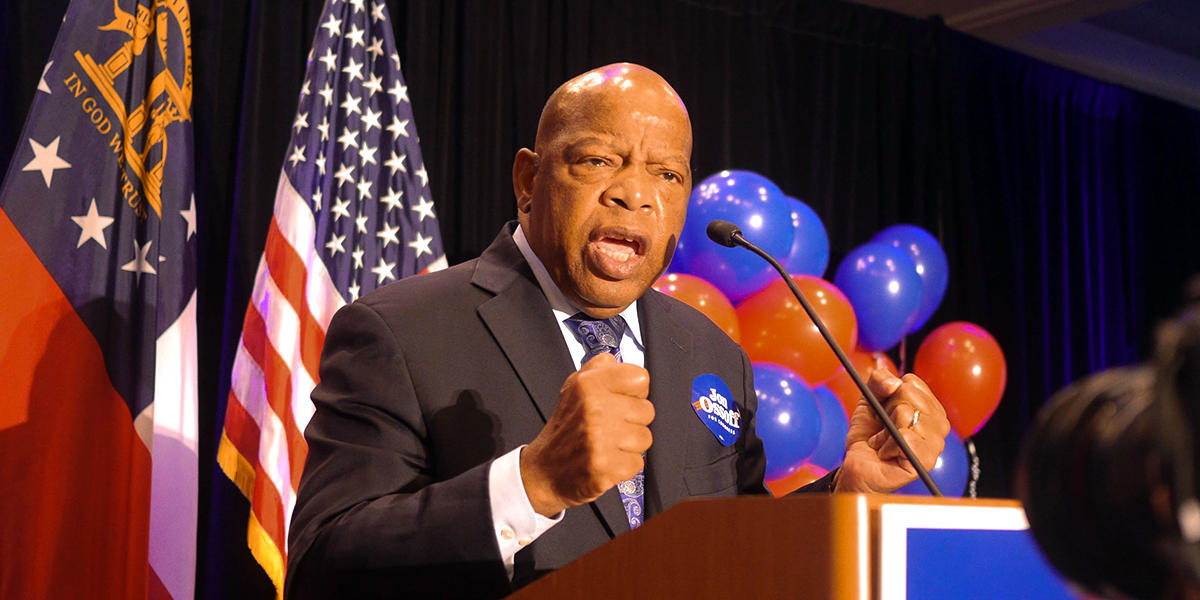Remembering The Life And Legacy Of John Lewis

Georgia Congressman John Lewis’ perseverance and activism were honored in a series of events celebrating his life.
Al Such / WABE
Former presidents and those who worked closely with the late Congressman John Lewis traveled to Atlanta to conclude his Celebration of Life ceremonies at Ebenezer Baptist Church.
Barack Obama, Bill Clinton and George W. Bush spoke about Lewis’ perseverance and activism Thursday. Hundreds also gathered outside the church to watch the services on a giant screen and pay their last respects to the civil rights icon.
The son of sharecroppers, Lewis served as a U.S. congressman for more than 30 years.
A growing collection of flowers, signs and tributes underneath the John Lewis mural on Auburn Ave. in Atlanta pic.twitter.com/BK1EQtt6Q2
— Emil Moffatt (@EmilMoffatt) July 18, 2020
For more than 30 years, WABE “Political Breakfast” podcast host Denis O’Hayer reported on Atlanta and happenings at the Gold Dome. That meant O’Hayer often recorded conversations with the late congressman. O’Hayer spoke with “All Things Considered” host Jim Burress and began with his memory of meeting Lewis for the first time.
Denis O'Hayer discusses John Lewis
A series of events celebrating Lewis’ life began Saturday in his hometown of Troy, Alabama.
On Sunday, a horse-drawn caisson carried Lewis’ body across the Edmund Pettus Bridge in Selma, Alabama — where Lewis and other voting rights demonstrators were beaten 55 years ago on “Bloody Sunday.” That day marked a key event in the fight for voting rights for African Americans. The Voting Rights Act of 1965 passed soon after Lewis led protesters across the bridge.
Yet, more recently, a 2013 Supreme Court decision invalidated part of the act. The court’s decision gave nine states, including Georgia, the freedom to alter election laws without first getting federal approval. Most of those states are in the South.
Meanwhile, a measure to restore that provision and give the federal government more power over state and local jurisdictions passed the U.S. House in December.
Democratic Representative and House Majority Whip James Clyburn recently proposed renaming that key provision — H.R. 4 — the John R. Lewis Voting Rights Act. It passed the lower chamber and now faces a tough U.S. Senate, unlikely in its current form to give the federal government more power to stop voter suppression.
Clyburn spoke with Burress about renaming the bill in honor of Lewis.
My dear friend, John, and I would often encourage each other by saying, “keep the faith, my brother.”
I loved him and will miss him very much.
As John would want us all to do, I will honor him by keeping my eyes on the prize.
— James E. Clyburn (@WhipClyburn) July 30, 2020
Jill Savitt, the CEO of the National Center for Civil and Human Rights in downtown Atlanta, also echoed her feelings of John Lewis’s magnitude in the fight for equality. She spoke with Burress before Lewis was laid to rest at South-View Cemetery in Atlanta.
Jill Savitt discusses John Lewis
Lewis’ body also lay in state at the Alabama State Capitol in Montgomery, the Georgia State Capitol in Atlanta and the U.S. Capitol in Washington, D.C. He was the first Black congressman to lie in state in the U.S. Capitol Rotunda.
Lewis died July 17 at the age of 80, months after he was diagnosed with advanced pancreatic cancer.
Lily Oppenheimer and Pat St. Claire contributed to this report.








